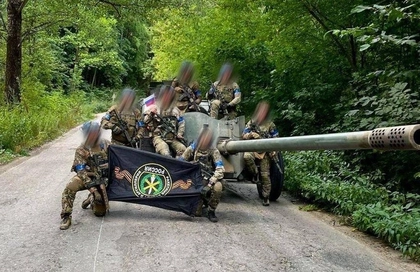The General Staff of the Ukrainian Armed Forces (AFU) reported ongoing battles for the border town of Vovchansk in the Kharkiv region, with Russia achieving tactical success.
“The enemy deployed significant forces, up to five battalions, in the attack on the town and is disregarding its losses,” the report stated.
JOIN US ON TELEGRAM
Follow our coverage of the war on the @Kyivpost_official.
The AFU disclosed that Russian troops have lost more than 100 soldiers in a single day in this sector alone.
“At present, the enemy has gained tactical advantage,” the report said.
The General Staff also reported ongoing combat operations in sectors including Pylna, Lukyantsi, Hlyboke, Oliynikove, Murom, Buhruvatka.
“During the day, the enemy initiated 22 assaults in these sectors, with 14 still ongoing,” the message read.
According to Deep State data, Russian forces have occupied additional villages in the Kharkiv region and are advancing towards Vovchansk.
The Deep State map revealed that in proximity to the settlement of Lyptsi, Russian forces have seized control of the settlements of Morokhovets-Oliinykove-Zelene, advancing further toward the village of Lyptsi.
Intense fighting persists for the village of Lukyantsi, where Russian forces are nearly in full control, while attempts to gain a foothold in Hlyboke continue.
Deep State reported ongoing Russian advancements towards Vovchansk, positioning themselves on the outskirts for potential entry into the city.

What if Russia Wins?
Contradictory reports on Russian troop entry into Vovchansk have circulated on social media, with the Center for Strategic Communications and Information Security (Spravdi) labeling it as Russian propaganda.
In a statement to Ukrainian media, Tamaz Gambarashvili, the head of the Vovchansk local military administration, said there is currently no officially confirmed information regarding the presence of Russian forces in the settlement.
He noticed, however, that automatic gunfire and explosions are audible along the northern edge of the city.
Gambarashvili said that Vovchansk is merely four kilometers from the border, stating that “this area is constantly under fire, with ongoing battles.”
The Institute for the Study of War (ISW) assessed that Russian offensive efforts to seize Vovchansk are “in large part a consequence of the tacit Western policy” regarding what weapons can be used on targets inside Russia.
According to the ISW analysis: “Russian forces are reaping the benefits of the West’s long-term restriction on Ukraine using Western-provided weapons to strike legitimate military targets on Russian territory – territory that Russian forces now depend on to sustain their offensive operations in northern Kharkiv Oblast [region].”
Building defensive lines along the border with Russia not feasible now
According to Andrii Kovalenko, head of the National Security and Defense Council’s Center for Countering Disinformation, there is significant manipulation regarding the construction of defense lines in the region.
“It would be impossible to establish defensive lines directly on the border with the enemy because all equipment and engineers would be vulnerable to destruction by enemy drones and artillery,” Kovalenko reported.
He revealed that defensive lines have indeed been established within the Kharkiv region.
“Further details will be provided soon. These defense lines are robust and reliable. Therefore, let’s not confuse the border with Kharkiv. The defense operation is ongoing,” Kovalenko added.
The commander of the Kharkiv operational-strategic group replaced
The RBC-Ukraine media outlet reported the replacement of the commander of the operational-strategic group “Kharkiv” amid the ongoing Russian offensive in the north of the region, responsible for the Slobozhansky sector of defense.
Mykhailo Drapaty has assumed this position, succeeding Yuriy Halushkin, while retaining his role as Deputy Chief of the General Staff.
Previously, in April 2024, Halushkin had taken over as the commander of the “Kharkiv” group, succeeding Andriy Hrytskov.
Drapaty’s military experience includes commanding the 2nd mechanized battalion of the 72nd separate mechanized brigade, which played a crucial role in the defense of Mariupol in May 2014.
He pursued further education at the National Defense University of Ukraine, transitioning to a correspondence program while serving as chief of staff of the 30th separate mechanized brigade in the antiterrorist operation zone (ATO).
Drapaty’s command roles include leading the 58th separate motorized infantry brigade in 2016 and serving as brigade commander directly in the ATO zone from 2017 onwards.
Recognized for his contributions, Drapaty was promoted to the rank of colonel in April 2019.
Until January 2024, he led the operational group “Kherson,” and notably played a key role in the liberation of the right bank of the Kherson region in 2022.
Furthermore, in February 2024, he assumed the position of deputy chief of the General Staff for military training.
You can also highlight the text and press Ctrl + Enter






